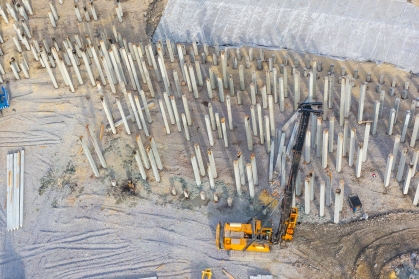Department of Civil and Environmental Engineering Research Area
Geotechnical Engineering

Geotechnical engineers play a critical role in the built environment by investigating and interpreting the subsurface and its role in structure and infrastructure performance. Rutgers geotechnical engineers are developing new techniques for characterizing the subsurface and existing infrastructure, designing new geotechnical infrastructure systems, and redesigning existing systems to meet the changing demands from anthropogenic climate change and natural hazards, as well as, developing new and novel techniques and technologies for using different soils in the built environment.
The research program focuses on producing practical solutions to existing problems by building on and developing new novel fundamental insights into soil behavior.
Associated Faculty
Nenad Gucunski, Ali Maher, Tyler Oathes, Hao Wang, Thomas Bennert, Robert Miskewitz
Research Clusters
Ground Improvement
Faculty: Ali Maher, Robert Miskewitz, and Tyler Oathes
Ground improvement focuses on enhancing the properties of problematic soils and rocks and making them more suitable for construction, infrastructure development, or other engineering purposes. The primary goal of geotechnical ground improvement is to increase the load-bearing capacity, reduce settlement, improve stability, and mitigate potential geotechnical hazards in the subsurface materials. The geotechnical group at Rutgers has been engaged in the development of novel stabilization techniques for contaminated sediments, and in-situ and ex-situ soft soil stabilization.
Dynamic Soil-Structure Interaction, Soil Dynamics and Earthquake Engineering
Faculty: Nenad Gucunski, Tyler Oathes
This research utilizes experimental and numerical techniques to investigate wave propagation in the subsurface (and other media) to characterize existing ground conditions and built infrastructure, evaluate the significance of dynamic soil-structure interaction effects on the structural performance under operational loads, as well as to assess and reduce the hazard posed to communities from earthquakes. This includes developing and implementing a large suite of nondestructive and geophysical testing techniques, assessing the fundamental behavior of soils during earthquake loading, and evaluating the performance of significant geotechnical and infrastructure systems due to earthquake loading.
Geotechnical and Geoenvironmental Infrastructure Resiliency
Faculty: Ali Maher, Robert Miskewitz, and Tyler Oathes
We use a combination of numerical and experimental techniques to reduce the hazard posed to communities by and increase the resiliency of geotechnical infrastructure systems from natural hazards and anthropogenic climate change. This work involves using numerical, experimental, and field approaches to expand the beneficial use of dredged sediments, investigate the interplay between fundamental soil behavior and static and dynamic infrastructure performance, and develop interdisciplinary remediation approaches for contaminated infrastructure.
Pavement Materials and Engineering
Faculty: Hao Wang, Thomas Bennert, and Ali Maher
We use advanced material characterization, analytical and numerical modeling, and field performance monitoring to develop cost-effective solutions for durable, sustainable, and safe pavements. This work includes a wide range of pavement-related research for transportation agencies and the construction industry, including high-performance and green pavement materials, performance-based mix design and testing methods, pavement structure modeling and analysis, pavement construction specifications, pavement preservation, maintenance, and recycling, pavement surface characteristics related to skid resistance, noise, and rolling resistance.